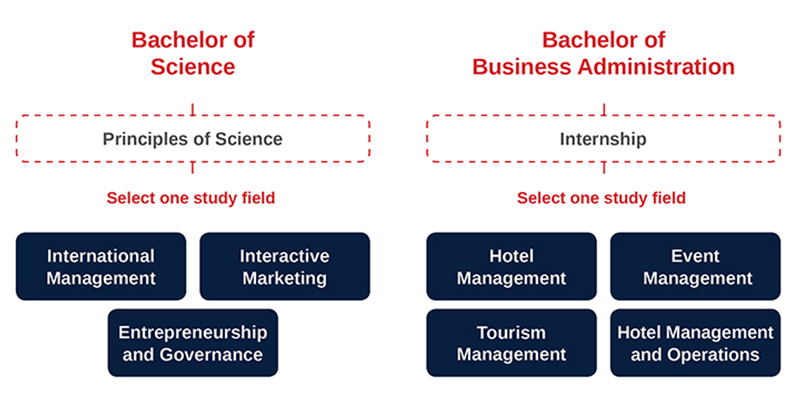New Bachelor Majors for fall 2017
February 01, 2017
Starting in fall 2017, Bachelor students will have even more study options at MODUL University Vienna. With the introduction of new Major study fields, Bachelor students can now specialize in seven different areas drawing on MU’s research strengths.
All our bachelor programs share a common body of covering fundamentals of management and business administration, such as financial management, human resources, marketing, information technology and economics as well as communication and personal development courses to improve presentation skills and academic writing, and boost communication abilities.
Building on this solid foundation, students now have the option to deepen their knowledge of the tourism, hospitality or events industry with a Bachelor of Business Administration (BBA). BBA students can choose to specialize in Event Management, Tourism Management or Hotel Management in the three year programs or, with an extra year of hands-on study, Hotel Management and Operations. In all BBA programs, an internship provides the opportunity to integrate theoretical concepts in a professional environment and to reflect on professional practice.
The Bachelor of Science (BSc) programs teach state-of-the-art management competencies and leadership skills in an international context, and foster research and scholarly skills and to advance business knowledge. After the shared core modules, BSc students can specialize in International Management, Entrepreneurship & Governance or Interactive Marketing.
Study Fields Overview
BACHELOR OF BUSINESS ADMINISTRATION
Event Management
This field equips students with the necessary skills and knowledge to design, develop and stage innovative and successful events. The courses cover the entire events cycle: from the inception of an idea or concept to the operationalization, including professional project management, the staging phase of an event, to the post-event assessment and critical impact analysis.
Tourism Management
Students will learn managerial decision making in destination management organizations, development of tourism products, understanding tourism policy, tourism demand analysis and forecasting, as well as the integration of information technology and the concept of smart destinations. They will strengthen their analytical skills by working with real destination data and learning how to interpret its practical implications for the industry.
Students will gain in-depth knowledge of the hotel industry with a particular focus on the supply side and create and plan a hotel project from start-to-finish. Current and emerging business and management models are analyzed and the hotel performance is monitored. They will operate their own hotel in a simulated environment, competing against each other and challenging their innovation and entrepreneurial capabilities.
Hotel Management and Operations
Courses in Restaurant and Service Management, Culinary Theory and Practice, and Rooms Division Management will provide students with the necessary practical skills and expertise to successfully engage in professional practice. They will also study advanced hotel management, covering topics such as hotel property planning, performance management and how to develop strategic business opportunities.
BACHELOR OF SCIENCE
Students will gain in-depth knowledge of a wide range of aspects of international businesses including management ethics, finance and taxation, entrepreneurship and innovation, and strategic management. Combined with a focus on research and analytical skills, this program provides a strong foundation for specialized master programs offered by leading national and international business schools.
Students will learn how to promote brands, goods and services, assess and manage their identity and reputation, acquire and retain customers through marketing efforts, coordinate marketing activities across channels, create a community, and involve users in feedback and co-creation.
Entrepreneurship and Governance
This study field introduces various governance actors, their power constellations, interactions and social ties, and links them to entrepreneurial activities. Key questions will focus on institutional frameworks across the stages of business development, from early stage start-up activities to more established businesses. Students will cover topics including collaboration, new types of incubators, infrastructure, and innovation, gaining skills both for their own entrepreneurial interest as well as for management positions in large companies.





